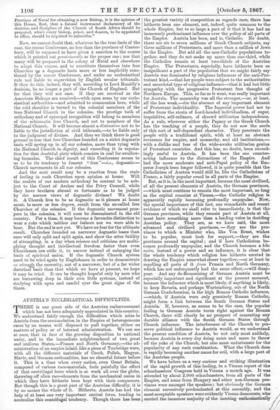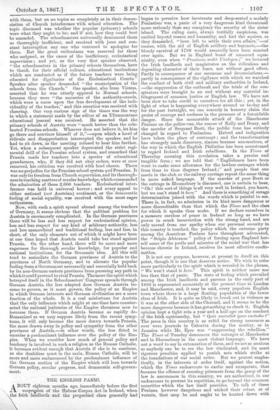AUSTRIA'S ECCLESIASTICAL DIFFICULTIES.
HERE is one great side of the Austrian embarrassment 1. which has not been adequately appreciated in this country. We understand fairly enough the difficulties which arise to Austria from the accumulation in the Empire of heterogeneous races by no means well disposed to pull together, either on matters of policy or of internal administration. We can see at once, that in face of the growing disposition to national unity, and in the immediate neighbourhood of two great and uniform States,—France and North Germany,—the ad- ministration of an empire inlaid, like a piece of Tunbridge ware, with all the different materials of Czech, Polish, Magyar, Slavic, and German nationalities, has no cheerful future before it. This is a time when every nation, even Great Britain, composed of various race-materials, feels painfully the effect of that centrifugal force which is at work all over the globe, throwing off alien race-elements from the mechanical union in which they have hitherto been kept with their conquerors. But though this is a great part of the Austrian difficulty, it is by no means the whole of it. Hitherto, Austria has had the help of at least one very important central force, tending to neutralize this centrifugal tendency. Though there has been the greatest variety of composition as regards ram, there. has hitherto been one element, not, indeed, quite common to the whole Empire, but to so large a part of it that it has had an immensely predominant influence over the policy of all parts of the Empire. Austria has been, and is, Catholic. No doubt, there are six to seven millions of Greek Church subjects, say three millions of Protestants, and more than a million of Jews- in the Empire. But add all the non-Catholic populations to- gether, and they do not make up more than one-third, while the Catholics remain at least two-thirds of the Austrian.
Empire. The Protestants, especially, have hitherto been so- insignificant a part of the population that we might fairly say' Austria was dominated by religious influences of the anti-Pro- testant kind,—that her people were subject to the authoritative- and sacerdotal type of religious influence—that it had but little' sympathy with the progressive Protestant free thought of' Northern Europe. This, so far as it went, was really important for Austria. The monarchy was all the stronger,—or, at least, all the less weak,—for the absence of any important element- of Protestant individuality. The Imperial power had not to, suffer from the strain of hard-headed individualism, of eager, inquisitive, self-reliance, of shrewd utilitarian independence.
As a rule, wherever either the Papacy or the Greek Church has the teaching of a people, they do not sow the seeds- of this sort of self-dependent character. They penetrate the people with a traditional spirit, with at least an abstract reverence for empire, and monarchy, and old institutions,-- with a dislike and fear of the wide-awake utilitarian genius of Protestant countries. And this has, no doubt, been exceed- ingly useful to Austria. It has been the one counter- acting influence to the distractions of the Empire. And' had the more moderate and anti-Papal policy of the Em- peror Joseph been longer followed, it is quite possible that the' Catholicism of Austria would still be, like the Catholicism of France, a fairly popular creed in all parts of the Empire.
But, as it is, in the most important, because the most civilized, of all the present elements of Austria, the German provinces, —which must continue to remain the most important, so long-- as the capital remains at Vienna,—the Catholic religion is- apparently rapidly becoming profoundly unpopular. Now the special importance of this fact, one remarkable and recent- evidence of which we shall refer to immediately, is that the' German provinces, while they remain part of Austria at all, must have something more than a leading voice in deciding Austrian policy. They are, as we have said, the most advanced and civilized provinces, — they are the pro- vinces to which a Minister who, like Von Beast, wishes. to be popular, must look for support,—they are the provinces around the capital ; and if here Catholicism be- comes profoundly unpopular, and the Church becomes a bgte noire, instead of a power and an influence, it is clear that the whole tendency which religion has hitherto exerted in- drawing the Empire somewhat closer together,—or at least in repelling all parts of it from Prussia and North Germany, which has not unfrequently had the same effect,—will disap- pear. And any de-Romanizing of German Austria must be- especially important and significant at the present moment, because the influence which is most likely, if anything is likely, to keep Bavaria, and perhaps Wurtemburg, out of the North. German Confederation, is the high Roman Catholic influence, —which, if Austria were only genuinely Roman Catholic, might form a link between the South German States and Austria. If, however, as seems to be the case, the popular' feeling in German Austria turns right against the Roman Church, there will clearly be no prospect of cementing any durable alliance with the South German States through Church influence. The interference of the Church to pre- serve political influence to Austria would, as we understand the present condition of Austria, be not only most unlikely, because Austria is every day doing more and more to throw off the yoke of the Church, but also most unfortunate for the' popularity of any such combination. What the Church does- is rapidly becoming another name for evil, with a large part of the Austrian people.
We have before us a very curious and striking illustration of the rapid growth of this feeling, in a Vienna report of the schoolmasters' Congress held in Vienna a month ago. It was- attended by about 2,000 schoolmasters, from all parts of the Empire, and some from Hungary and other non-German pro- vinces were amongst the speakers ; but obviously the German element excessively predominated at this assembly, and the most acceptable speakers were evidently Vienna democrats, who carried the immense majority of the meeting enthusiastically / with them, but on no topics so completely as in their denun- ciation of Church interference with school education. The topic discussed was whether the popular (primary) schools were what they ought to be; and if not, how they could best be amended. The schoolmasters universally denounced them as thoroughly inefficient, and received with jeers and con- stant interruption any one who ventured to apologize for them. But the great enthusiasm was reserved for those
who assigned, as the cause of the -inefficiency, ecclesiastical
supervision ; and yet, as the very first speaker observed, "the schoolmasters in the primary schools themselves, have to thank, for their official culture, educational institutions which are conducted as if the future teachers were being educated for dignitaries of the Ecclesiastical Courts." Speaker after speaker demanded "the emancipation of the schools from the Church." One speaker, also from Vienna, asserted that he was utterly opposed to Normal schools, because they were "the nurseries of the authority-creeds, which were a curse upon the free development of the indi-
viduality of the teacher," and this assertion was received with
cheering. One very curious sign of the times was the way in which a statement made by the editor of an Ultramontane educational journal was received. He asserted that the primary schools of Austria were "much better than the cele- brated Prussian schools. Whoever does not believe it, let him go there and convince himself of it,"—upon which a howl of ridicule and disapprobation interrupted the speaker, and he had to sit down, as the meeting refused to hear him further. Yet, when a subsequent speaker deprecated the strict regi- mental drill of the Prussian school system, and remarked that Prussia made her teachers into a species of educational gensdarmes, who, if they did not obey orders, were at once removed, his criticism was received with loud cheers. There
was no prejudice for the Prussian school system qua Prussian. It was only its freedom from Church supervision, and its thorough-
ness in teaching matters of secular knowledge, which commanded the admiration of these 2,000 teachers. Ecclesiastical inter- ference was held in universal horror ; and every appeal to
either national (not Austrian) sentiment, or the democratic feeling of social equality, was received with the most eager enthusiasm.
Now, with such a spirit spread abroad among the teachers of Germany, it seems obvious that the political problem for Austria is enormously complicated. In the German provinces there will be less and less respect for ecclesiastical opinion, less and less respect for any kind of arbitrary authority, less and less monarchical and traditional feeling, less and less, in short, of the only elements out of which it might have been at one time hoped that Austria could take her stand against Prussia. On the other hand, there will be more and more eagerness for thorough secular knowledge, for popular and national institutions, for the Germanic idea. All this will tend to assimilate the German provinces of Austria to the provinces of North Germany, and to alienate the popular feeling from a Government necessarily and essentially held back by its non-German eastern provinces from pursuing any path in whichitcould pretend to rival Prussia. Themore the spirit which betrayed itself in the Schoolmasters' Congress spreads through German Austria, the less adapted does German Austria be- come to govern, as it must govern, the policy of an Empire in which German interests and German civilization are a mere fraction of the whole. It is a real misfortune for Austria that the only influence which might at one time have counter- acted the national jealousies of the Empire threatens now to increase them. If German Austria become as rapidly de- Romanized as we may suppose likely from the recent symp- toms, it will only become the more drawn towards Prussia, the more drawn away in policy and sympathy from the other provinces of Austria,—in other words, the less fitted to exercise a predominant influence over the policy of the Em- pire. When we consider how much of general policy and tendency is involved in such a religion as the Roman Catholic, it becomes evident enough that Austria if she is to continue, as she doubtless must in the main, Roman Catholic, will be more and more embarrassed by the predominant influence of the German section of the Empire which will lean towards German policy, secular progress, and democratic self-govern- ment.































 Previous page
Previous page